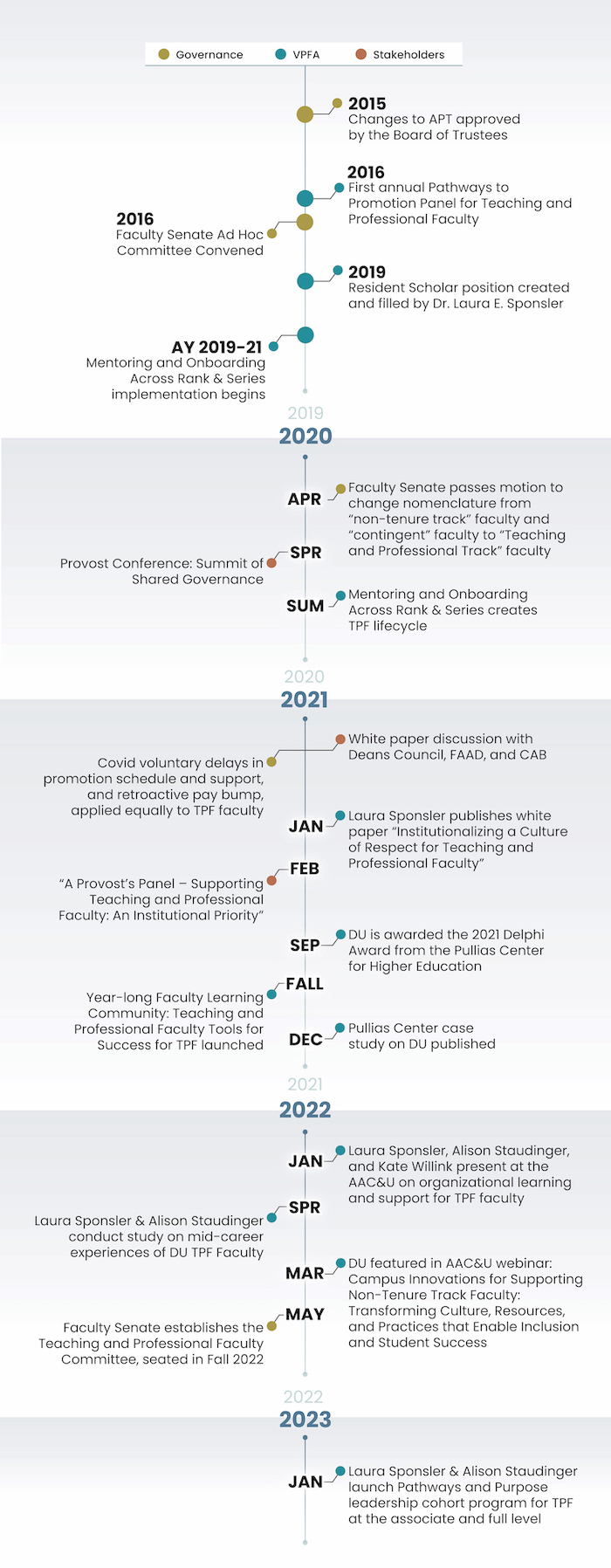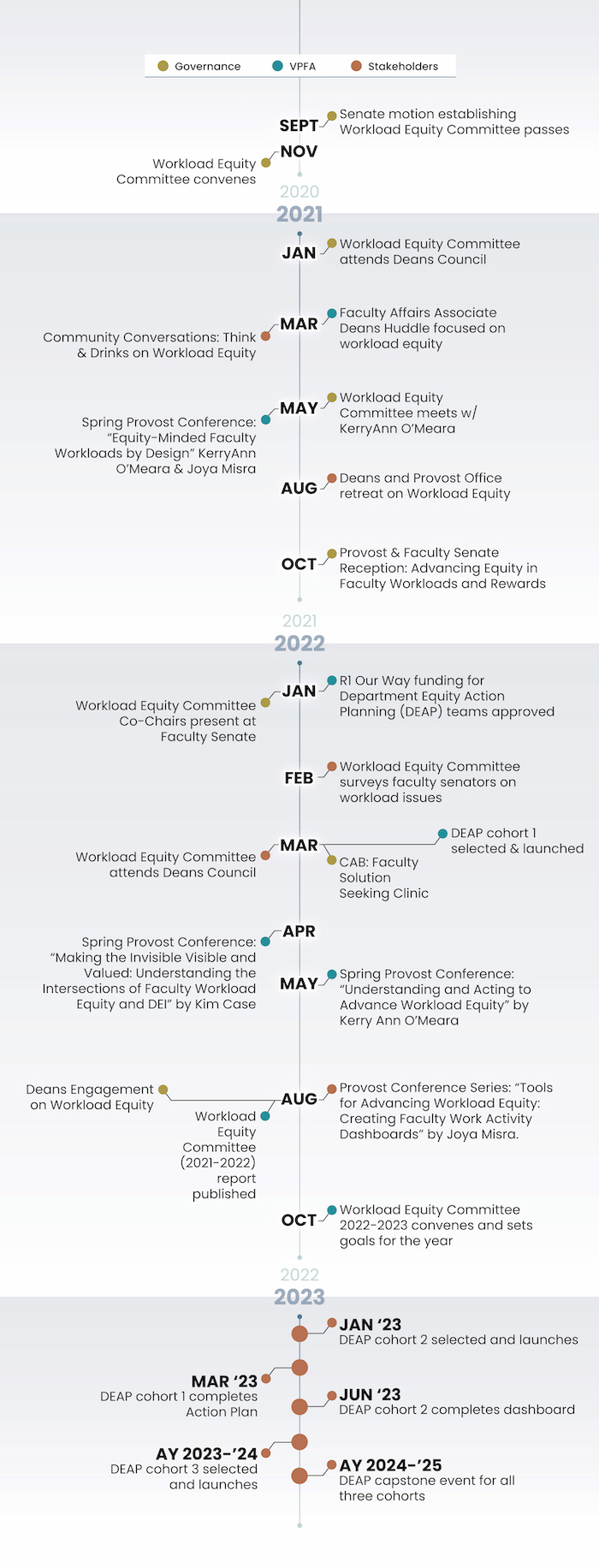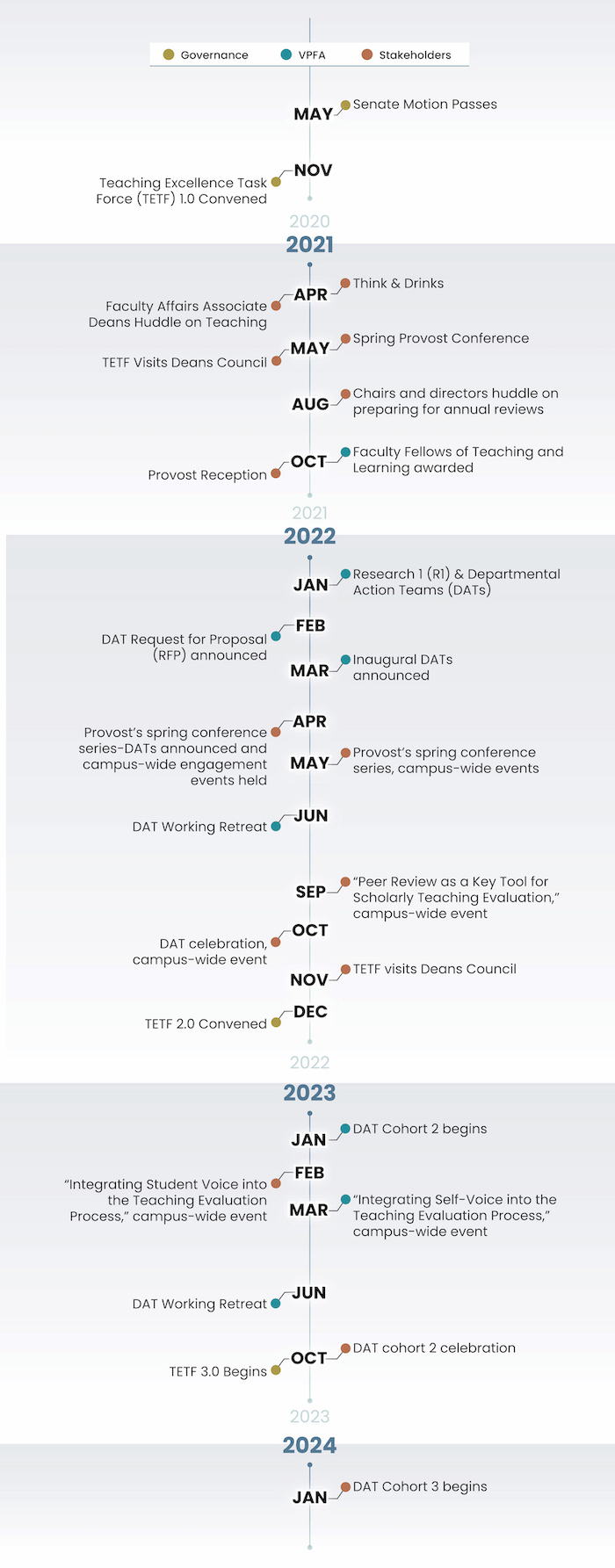Initiatives
In addition to programming and direct support for faculty facing challenges now, the VPFA works towards creating a better DU and professoriate through strategic and collaborative initiatives. Drawing on the expertise of faculty leaders, these efforts are driven by ecosystem approaches to institutional change and learning.
DU Symposium & Symposium Implementation
In the summer of 2019, the VPFA and the Faculty Senate hosted a summer symposium, wherein thirty-four faculty from across campus came together for two days to engage in collective problem-solving around an issue of shared concern: creating collaborative department cultures and chairs. This was a new opportunity for faculty, bringing together colleagues from across disciplines and ranks to discuss big ideas, possibilities, and opportunities. Faculty gathered with the shared purpose of improving the lives of faculty members in their department. Truly fair and fundamentally just department cultures and climates are among the most important interventions for quality of faculty life. Indeed, quality of faculty life predicts the affective commitment to institutional goals and challenges that require innovations across boundaries and disciplines. The presence of open, fair, and transparent departmental deliberation and decision-making processes, alongside departmental leaders who see it as their primary responsibility to safeguard the integrity of the process are necessary conditions of a collaborative climate. Such a climate both requires and generates faculty commitment and belonging, and results in greater professional success and satisfaction. At the end of the symposium, faculty teams pitched change-initiative ideas to the provost. Several of these ideas were funded as part of symposium implementation and have been institutionalized as vital faculty-led change initiatives.
Advancing Equity in Faculty Workload and Rewards
Faculty workload, especially in teaching and service, is often underrecognized and under-rewarded, even as it advances DU’s mission to be a great private institution dedicated to the public good. Workload is complex, as it varies across rank and series. Equity in faculty evaluation and career advancement is an area that requires greater institutional attention, so that DU can recruit, retain, and ensure the success of a diverse faculty. This project advances DU’s ability to count what matters—not simply what is easiest to count—through multilevel engagements emerging from shared governance. The Workload Equity Task Force had been advancing this work in relation to service, while the Teaching Excellence task force challenges the University to rethink how it values teaching. Additionally, the Covid task force put together a slate of measures to recognize disparate experiences during the pandemic and modify evaluations in response.
The VPFA also supported this work by engaging Deans, Associate Deans, Chairs and Directors, and faculty with national experts, like Joya Misra from University of Massachusetts–Amherst, KerryAnn O’Meara of the University of Maryland–College Park, and Kim Case from Virginia Commonwealth University to share their research on workload equity.
R1 Our Way: Teaching and Faculty Satisfaction Initiatives
Five initiatives were funded with over $650,000 in January 2022 to support teaching and faculty success during the transition to “Very High Research Activity Institution” (R1) status. VPFA and OTL leadership proposed these programs to maintain our distinctive “teacher scholar model,” support leadership and mentoring for all faculty series, address workload and burnout, and enhance the student experience.
- Teaching Excellence Department Action Teams. Led by the OTL and the Teaching Excellence Task Force, this multi-year project guides departments to consider current practices in order to better ensure the voices of self, student, and peer are reflected in teaching evaluation for annual and consequential review. Funding expanded faculty, staff, and student stipends, and supported three years of successive cohorts to participate in this transformative, equity-minded work. Three teams have completed DAT work in cohort one, and cohort two is underway.
- Leadership Training and Support. Focus on Teaching and Professional Faculty Chairs, Directors, Associate Deans, and other faculty leaders are essential supports for faculty as they navigate change, especially in relation to the promotion process. These one-time funds support faculty leaders such as chairs and directors, as they administer and analyze results from the University of Southern California’s Pullias Center’s survey instrument, implement the TPF faculty mentoring model developed by the TPF Mentoring and Onboarding Across Ranks and Series symposium group, and make their results public.
- Workload Equity Cohort: Department Equity Action Planning Teams. These funds expand the reach of the planned pilot at DU, fund three years of Department Equity Action Planning (DEAP) cohorts of five departments per year, along with national experts to lead workshops, administration of evaluation and self-study tools, and stipends for participating faculty who will undergo training on workload equity and implicit bias; create a department dashboard to catalyze conversations about workload; draft and revise a department equity action plan; and publicly present their work to the DU community.
- Adjunct Teaching Excellence Program. This program provides a pathway for DU’s adjunct faculty to demonstrate their teaching skills and earn a certification of their teaching excellence. Faculty choose from a set of curated professional development opportunities offered through the OTL, including asynchronous opportunities tailored for part-time instructors, and receive a $250 stipend upon completion.
- Collaborative on Academic Careers in Higher Education (COACHE) Faculty Job Satisfaction Survey. The COACHE survey offers unique insights into the faculty experience, capturing faculty sentiment regarding teaching, service and research, tenure and promotion, departmental engagement and collegiality, and other aspects of the academic workplace. As we live into R1, it is essential to understand faculty experience and priorities, and benchmark them as compared to our 2018 survey and to our peers. The COACHE survey will be administered again in 2023.
PROVOST CONFERENCES
Provost Conference 2020: Summit on Shared Governance
- “Shared Governance: History and Principles,” Brendan Cantwell (Michigan State University) February 21, 2020
- “Faculty Governance: When Things Go Badly Wrong,” Jeni Hart (University of Missouri), Brendan Cantwell (Michigan State University), Adrianna Kezar (University of Southern California) February 21, 2020
- “Teaching and Professional Track Faculty,” Adrianna Kezar (University of Southern California) February 21, 2020
Provost Conference 2021: The Post-Pandemic Professoriate
- “Equity-Minded Faculty Workloads by Design,” KerryAnn O’Meara (University of Maryland—College Park), April 15, 2021.
- “Evaluating the Impacts of Covid-19 on Faculty Careers.” Joya Misra, Dessie Clark, and Ethel Mickey (University of Massachusetts—Amherst), May 3, 2021
- “Advancing Teaching Excellence: A Conversation about Recognizing, Evaluating and Rewarding Teaching across Rank and Series,” Noah Finklestein (University of Colorado—Boulder), Dr. Gabriela Weaver (University of Massachusetts—Amherst), and Dr. Andrea Follmer Greenhoot (University of Kansas), May 18, 2021
Provost Conference 2022: Next Steps in Advancing Equity in Faculty Workload and Rewards
- “Advancing Equity in Teaching Excellence: A Celebration and Launch of Departmental Action Teams,” Noah Finklestein (University of Colorado—Boulder), Sarah Andrews (University of Colorado—Boulder), April 1, 2022
- “Making the Invisible Visible and Valued: Understanding the Intersections of Faculty Workload Equity and DEI,” Kim Case (Virginia Commonwealth University), April 14, 2022
- “Recognizing and Rewarding Inclusive Teaching in the Evaluation Process,” Kim Case (Virginia Commonwealth University), April 15, 2022
- “Journey to R1: Now What?” Corinne Lengsfeld, April 18, 2022.
- “Understanding and Acting to Advance Workload Equity,” KerryAnn O’Meara (University of Maryland—College Park), May 2, 2022.
- “Next Steps in Institutionalizing A Culture of Respect for Teaching & Professional Faculty: An Interactive Conversation and Luncheon,” Laura Sponsler, Alison Staudinger, Kate Willink, May 12, 2022.
- “Advancing Teaching Evaluation: An University Wide Effort,” Noah Finklestein (University of Colorado—Boulder), Sarah Andrews (University of Colorado—Boulder), May 17, 2022.
- “Webinar for Faculty: Representing your DEI work for tenure and promotion,” Kim Case (Virginia Commonwealth University), June 6, 2022.
- “Tools for Advancing Workload Equity: Creating Faculty Work Activity Dashboards,” Joya Misra (University of Massachusetts—Amherst), August 26, 2022.
Provost Conference 2023: Faculty Thriving and Student Learning
- “Faculty Matter: Thriving as a Teacher-Scholar in Times of Burnout,” Nancy Chick (Rollins College) and Peter Felten (Elon University), February 2, 2023
- “Relationships Matter: Teaching for Learning, Equity, and Well-Being,” Peter Felten (Elon University) February 2, 2023
- “Teaching Matters: Capturing Moments of Hope in Your Work as Teacher-Scholar,” Nancy Chick (Rollins College), February 3, 2023
- “Yes…And: Sustainable and Scalable Approaches to Equitable Workload Reform,” KerryAnn O’Meara (University of Maryland—College Park), February 3, 2023
Next Steps in Institutionalizing a Culture of Respect for TPF
Building on the release of Laura Sponsler’s white paper, “Institutionalizing a Culture of Respect for Teaching and Professional Faculty,” the VPFA has continued to advance support for the teaching and professional faculty series. Along with workshops, FLCs, and other supports to help faculty understand pathways to promotion, the VPFA works at the policy level to bring transparency and equity to promotion and renewal processes. In recognition of this work, the University won the 2021 Pullias Center Delphi Award for supporting faculty off the tenure track. This led to presentations at the AAC&U annual conference, national visibility as a leader in this area, and intensive engagement with peer institutions around culture change that centers respect for all faculty.
Faculty Data & Dashboards
An important VPFA priority has been to improve faculty data governance and collection practices. The VPFA and the Faculty Senate co-created a data governance policy committee to improve transparency and constituent agency, such that any faculty survey administered internally or externally should allow for faculty voice in the process. The VPFA also brought together colleagues from Budget & Finance, IT, and IR to collaborate on a data-cleaning project that will result in reliable faculty data. This will allow the building of dashboards and other instruments to help DU community members make data-driven decisions, and to work to understand and ameliorate equity gaps.
VPFA Web presence
The VPFA website was originally launched in spring of 2020 with about a dozen key pages and posts. It now hosts five major microsites (Chairs & Directors Handbook, COACHE, Teaching and Professional Faculty Lifecycle, R1 Our Way/Advancing Equity in Faculty Workloads & Rewards, and Investing in Faculty: Supporting Teaching Enhancements); numerous interactive infographics and innovative information display modules; over 300 blog posts; and over 50 additional pages of relevant, frequently updated content. In its first few months of existence, the website saw only a handful of daily visitors. Since then, readership has nearly doubled from around 900 to an average of 1,700 monthly visitors. The website sees more consistent weekly visits over a much wider range of pages each month, showing that efforts over time to develop content that is useful, relevant, and engaging have been worthwhile to readers.
PEOPLE
Bobbie Kite, Ph.D.
Faculty Fellow for Faculty Academic Informatics and Analytics
Bobbie is a Professor, Associate Dean of Academic Operations and Affairs at University College, and Director of the Healthcare Programing there. In conjunction with the OTL and VPFA, she works to design outcome metrics—building conceptual frameworks, piloting projects, analyzing preliminary data, and creating dissemination material for the VPFA portfolio. Kite is also a member of the COACHE Executive Committee, presenting unit-level results to parallel the academic areas identified by COACHE. These analyses will pave the way for unit-level actions on areas of concern, while laying the framework for future COACHE surveys.
VPFA Staff
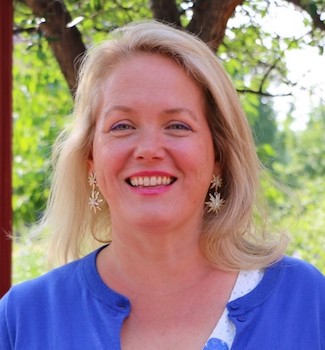
Kate Willink
Vice Provost for Faculty Affairs, Associate Professor of Communication Studies
Kate Willink is the inaugural Vice Provost for Faculty Affairs and an Associate Professor of Communication Studies. The Vice Provost for Faculty Affairs (VPFA) works closely with the Provost and Executive Vice Chancellor and faculty members across the university to support the continued excellence of DU faculty by enhancing faculty development initiatives, increasing faculty diversity, and building a strong, inclusive, and collaborative faculty community. Through collaboration and innovation, Kate works closely with deans and department heads to recruit and retain high-quality faculty, support faculty career advancement, and to create collaborative department cultures that support transparency, equity, trust, and belonging.
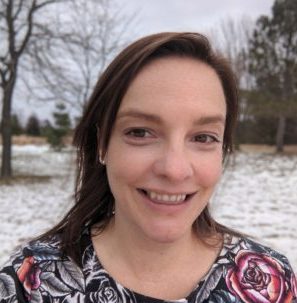
Alison Staudinger, Ph.D.
Director of Faculty Development & Career Advancement
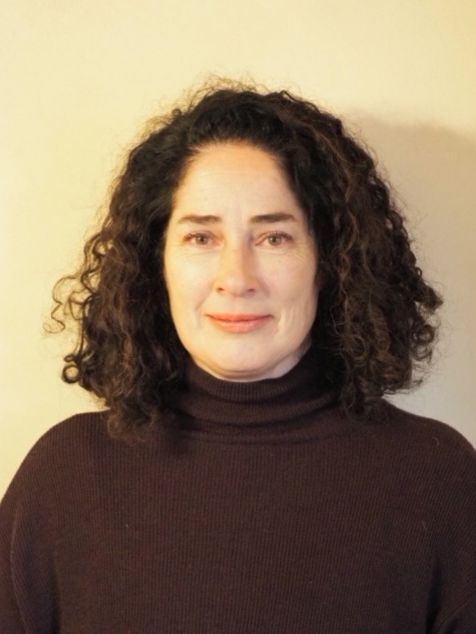
Terese Rainwater, PH.D.
Project Manager, R1 Our Way Teaching & Faculty Satisfaction Initiatives
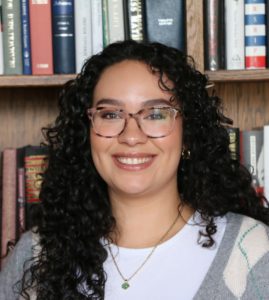
Elise Rosado
Web Content Developer

Reagan Stohler
Executive Assistant to the Vice Provosts


